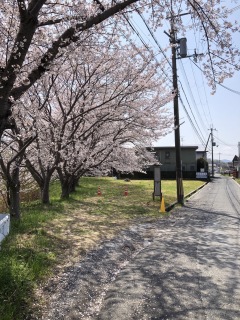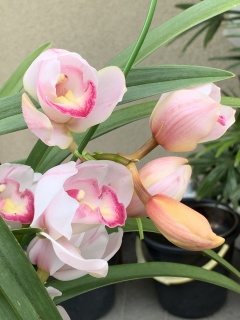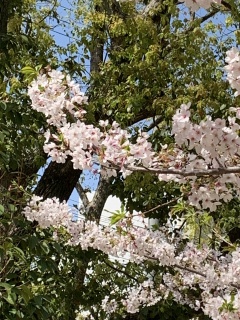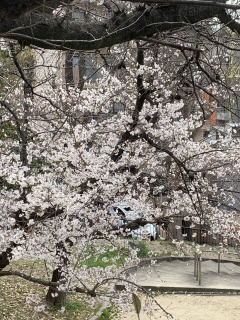Some silliness before a stressful weekend
Apr. 11th, 2025 10:56 pmA bit of Chinese wordplay that I thought was funny: when two people in white shirts stand on either side of one in a black shirt, someone describes them as 利奥利 (lì-ào-lì). Guess why (or see the answer here). Answer: Oreo cookies in Chinese are 奥利奥, which is just transliteration; but it makes perfect sense that if the black-white-black Oreo coloring is ào-lì-ào, then white-black-white would be lì-ào-lì… .
Also a word/character that I enjoy for its just-exactly-like-that-ness: 汆, which means to parboil, and which is made up of 入, put into, and 水, water. (Also relieved that water is water in Chinese, unlike Japanese, in which water 水 and hot water (お)湯 are separate words; Y and I had a debate over the Japanese expression in which you “boil hot water,” which doesn’t make much sense to me; a case in which the object is the result of the verb?).
Trying to transcribe something in Chinese (an interview about my favorite singer) which is unsubtitled, and finding it extremely difficult, although the speaker doesn’t go too fast and pronounces things quite clearly, apart from the sh/zh = r thing which all Chinese men seem to do. Even so there are a lot of gaps and places where I can hear the word but can’t figure out what character it might be. I did notice that sometimes a line which absolutely stumps me on one day seems quite clear when I come back to it the next; not sure why, but it’s interesting.
I’ve been enjoying everyone’s 100-formative-books lists, and finally gave in and made my own here. Featuring a lot of the same photograph (does it count as a stock photo if it’s one I took?) in place of a book cover image, because I couldn’t bring myself to search for images of ALL the Japanese books, quite a few of the English ones, etc. Why don’t they just give you a “no image” option? Also, I feel like I’ve left a lot out; I don’t remember all the books that were childhood favorites! I mean, if the titles or authors come up I naturally remember the books themselves, but I can’t list them all off out of thin air, and my physical books have undergone many shifts due to changing houses, countries, etc. etc. Where is there a giant master list of “all the books someone of my generation would have been likely to read growing up, Anglophone edition”…
One of my original-thing characters is having a professional breakthrough of sorts and I can’t tell whether I’ve managed to be as smart as she is or completely dumb (whether it’s going to make any sense to the [hypothetical] readers or seem like it was obvious five chapters ago). I should probably be relieved that I’ve managed to come up with something for her to be inspired about; it took me literally over a year to solve another character’s similar problem for him, jeez. I’m just about halfway through the whole thing now and things are starting to happen, but I still have SO MANY question marks in my outline and I’m making such very slow progress, oh dear.
Music: an older recording of Chen Ming and Jiang Dunhao singing 让, because I continue to be obsessed, and also I like this song; also last week’s radio opera was Figaro, so here’s Jessye Norman singing Dove sono, just because it’s one of the most beautiful things in the universe.
Photos: lots more sakura and cats, also one of the prettiest weeds I’ve seen.
Be safe and well.
Also a word/character that I enjoy for its just-exactly-like-that-ness: 汆, which means to parboil, and which is made up of 入, put into, and 水, water. (Also relieved that water is water in Chinese, unlike Japanese, in which water 水 and hot water (お)湯 are separate words; Y and I had a debate over the Japanese expression in which you “boil hot water,” which doesn’t make much sense to me; a case in which the object is the result of the verb?).
Trying to transcribe something in Chinese (an interview about my favorite singer) which is unsubtitled, and finding it extremely difficult, although the speaker doesn’t go too fast and pronounces things quite clearly, apart from the sh/zh = r thing which all Chinese men seem to do. Even so there are a lot of gaps and places where I can hear the word but can’t figure out what character it might be. I did notice that sometimes a line which absolutely stumps me on one day seems quite clear when I come back to it the next; not sure why, but it’s interesting.
I’ve been enjoying everyone’s 100-formative-books lists, and finally gave in and made my own here. Featuring a lot of the same photograph (does it count as a stock photo if it’s one I took?) in place of a book cover image, because I couldn’t bring myself to search for images of ALL the Japanese books, quite a few of the English ones, etc. Why don’t they just give you a “no image” option? Also, I feel like I’ve left a lot out; I don’t remember all the books that were childhood favorites! I mean, if the titles or authors come up I naturally remember the books themselves, but I can’t list them all off out of thin air, and my physical books have undergone many shifts due to changing houses, countries, etc. etc. Where is there a giant master list of “all the books someone of my generation would have been likely to read growing up, Anglophone edition”…
One of my original-thing characters is having a professional breakthrough of sorts and I can’t tell whether I’ve managed to be as smart as she is or completely dumb (whether it’s going to make any sense to the [hypothetical] readers or seem like it was obvious five chapters ago). I should probably be relieved that I’ve managed to come up with something for her to be inspired about; it took me literally over a year to solve another character’s similar problem for him, jeez. I’m just about halfway through the whole thing now and things are starting to happen, but I still have SO MANY question marks in my outline and I’m making such very slow progress, oh dear.
Music: an older recording of Chen Ming and Jiang Dunhao singing 让, because I continue to be obsessed, and also I like this song; also last week’s radio opera was Figaro, so here’s Jessye Norman singing Dove sono, just because it’s one of the most beautiful things in the universe.
Photos: lots more sakura and cats, also one of the prettiest weeds I’ve seen.
Be safe and well.
































































































